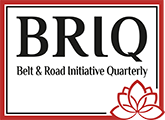
BRIQ Belt & Road Initiative Quarterly is open to article submissions on the theme of "The Crisis of the Hegemonic Financial System and the Rising Search for Financial Cooperation in the Developing World" for the 2023-2024 Winter issue.
Due to the Covid-19 epidemic, the economic crisis that Western capitalism has been experiencing since 2008 is getting worse. Under these circumstances, the overly-financialized Western economy lost its production capacity, and Asia, particularly China, emerged as the engine driving global production.
All these developments have shaken the foundations of the international financial system, in which the currencies of Western countries are accepted as a 'safe haven'. Moreover, the sanctions against Russia and the commercial pressures against China, especially with the accession of Crimea to the Russian Federation, accelerate the efforts of developing countries to develop alternative financial systems. Central banks of developing countries, especially those with high production power, have begun to reduce the reserves of Western currencies and to seek alternative reserves.
The studies carried out by Russia and China on alternative money transfer mechanisms and payment systems have gained an official character since 2019, and with this development, the foundations of an alternative financial system have been laid. The two countries are challenging the dominance of the US dollar by developing trade with national currencies while increasing the bilateral trade volume. In addition, the integration process of Russia's SPFS system and China's CIPS messaging and payment systems has begun. On the other hand, the model of promoting trade in national currencies through SWAPs developed by China is rapidly becoming widespread in BRI countries.
Based on the framework above, BRIQ Belt & Road Initiative Quarterly is open to articles, essays and book reviews on the following topics in Turkish and English.
- Alternative policies proposed or implemented against dollar dominance,
- Criticism of the hegemony of international financial institutions such as the IMF and initiatives developed as an alternative to these institutions,
- The current status of digital currency systems developed by central banks in countries within the scope of the Belt and Road Initiative and the possible effects of trade with national currencies
- Transformation of the financial system in BRI countries in the context of SWAP and alternative payment systems
- New credit mechanisms created by BRICS and possible consequences of new currency studies
- New financial initiatives led by regional cooperation organizations such as Shanghai Cooperation Organization and ALBA
Submission Guidelines
BRIQ (Belt & Road Initiative Quarterly) is a scholarly journal of international politics, economy, and culture.
Belt and Road Initiative Quarterly (BRIQ) features a broad range of content, from academic articles to book reviews, review essays, interviews, news reports, and feature articles.
The Editorial Board can issue calls for papers for special issues and invite authors to contribute manuscripts; however, it also welcomes unsolicited submissions.
Submissions are invited in English or Turkish. All submissions are to include a short biography (150-word limit) and should be sent as Microsoft Word attachments to briq@briqjournal.com . Articles or other content that have been previously published or are under review by other journals will not be considered for publication.
BRIQ follows American Psychology Association style (6th edition, https://www.apastyle.org) and uses American English spelling.
BRIQ uses a double-blind review process for all academic articles.
Academic articles should be between 5,000 and 9,000 words in length, including abstracts, notes, references, and all other content. Please supply a cover page that includes complete author information, and a fully anonymized manuscript that also contains an abstract (200- word limit) and 5 keywords.
Book reviews should not exceed 1,000 words; review essays covering two or more works can be up to 3,000 words.
News reports consisting of brief analyses of news developments should not exceed 1,500 words; feature articles combining reporting and analysis can be up to 3,500 words.
Please contact the Editorial Board for interview proposals.
